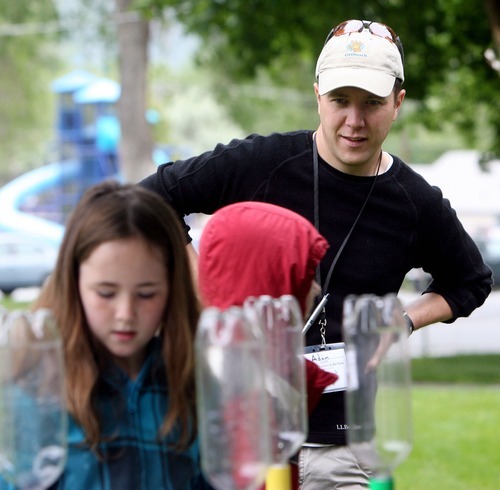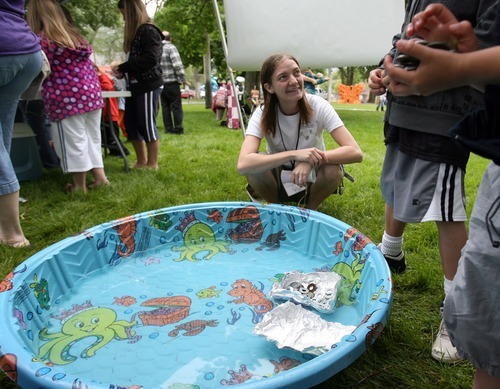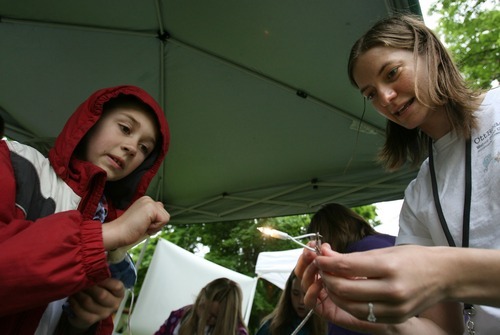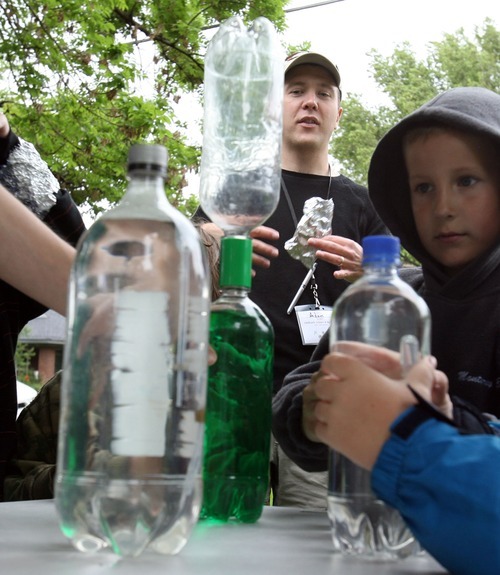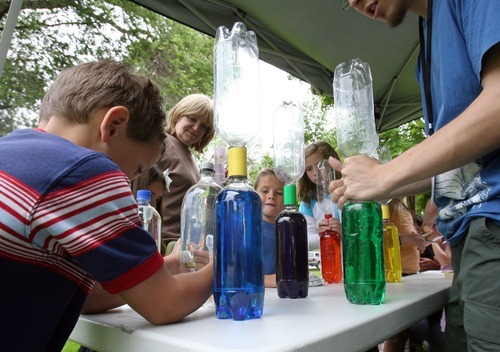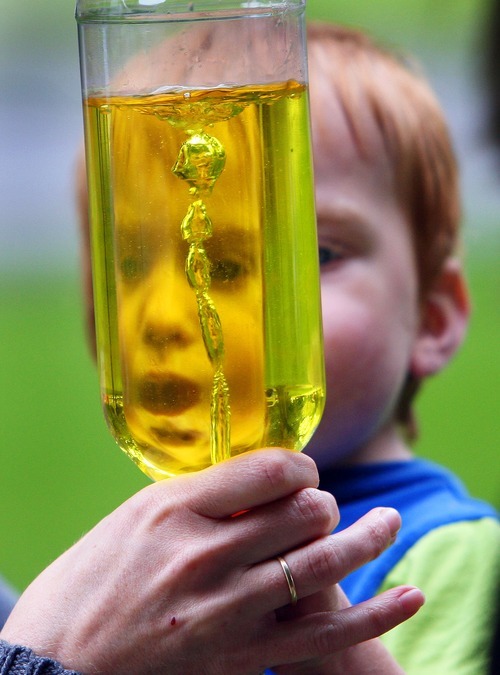This is an archived article that was published on sltrib.com in 2011, and information in the article may be outdated. It is provided only for personal research purposes and may not be reprinted.
Ogden • Zander Adkinson's interest in science has been honed from watching documentaries about astronomy and planets beyond our solar system.
"I like space. Scientists have found a planet with liquid water, but no life on it," said the Ogden home-schooled fourth-grader. On Monday, he was among dozens of kids learning about physics at Ogden's Lorin Farr Park as part of Weber State University's summer Science in the Parks program.
Adkinson explained an experiment, called the Cartesian diver, which uses a capped plastic bottle full of water. Inside, an eyedropper weighted with a nut floats at the top, but when the bottle is squeezed, pressure forces water up the dropper, causing it to sink.
"You don't need an electron microscope on your kitchen counter. If you have two liter bottles and duct tape you can do some science," said Adam Johnston, a Weber physics professor who directs the lunch-hour program. The university used a NASA grant that supported outreach for Weber's Ott Planetarium to start the program in 2007. It is now funded with local dollars from Weber County's RAMP fund, the .1 percent sales tax that raises $3 million annually for recreation and arts, and the Utah Families Foundation.
Meanwhile, the planetarium runs its Science Saturdays every second and fourth Saturday during the summer, from noon to 5 p.m. at Lind Lecture Hall on the WSU campus.
Science in the Parks piggybacks onto Ogden School District's summer lunch program that feeds kids in neighborhood parks. Rather than have parents drive children to the university campus, Weber State's Center for Science and Math Education takes the science program to the kids.
"Here they are walking to get their lunches, not getting driven around town. We'll reach hundreds of kids instead of just dozens," said Johnston, the co-founder of the Science Education at the Crossroads conference and the Utah Science Teachers Association's 2010 teacher of the year. "The parks allow us to model science as play."
Last year, at least 700 children participated, most multiple times. The program will tour six different Ogden parks for one-week stints, with a different set of themed experiments on each weekday. Monday's theme was "build it."
In one of the activities, kids created boats from a sheet of aluminum foil, which they floated in a wading pool to see how much weight they could support before sinking.
"We don't give any instruction. We let them be the engineer," said student director Sharon Gatrell, a piano performance major who is minoring in physics. "We let them make any shape they like. We throw it in and see how many washers it holds."
Some kids kept adding washers even after their creations sunk, but the hope is they would learn something about buoyancy. The best foil boats are left flat with their edges turned up to maximize surface area in contact with the water.
Another experiment required taping together two disposable cups at their bases, then wrapping a long rubber band around the tapered waist of what would be a makeshift aircraft. The kids were directed to hook one end of the rubber band around their thumb and pull back the craft with their other hand. When they released the cups, the spin initiated from the rubber band kept the craft aloft for a few seconds.
Activities like those in Science in the Parks demonstrate how things work, but without getting bogged down in mathematical equations, according to Michelle Warby, a Weber physics education major who works for Ott Planetarium.
"This gets kids some hands-on experience so they can see science can be fun," Warby said.
Science in the Parks
The free programs, run by Weber State University faculty and students, are weekdays from 11:30 a.m. to 1 p.m. in Ogden city parks, held in conjunction with the Weber County's free lunch program. Upcoming locations:
June 13-17 • Lorin Farr Park, 769 E. Canyon Road
June 20-24 • Liberty Park
June 27-July 1 • Monroe Park
July 5-8 • Jaycee Park
July 11-15 • West Ogden Park
July 18-22 • Marshall White Park
Themes
Each day of the week, this free program pursues a different theme in the physical sciences.
Monday • Build it
Tuesday • See it
Wednesday • Hear it
Thursday • Move it
Friday • Feel it


